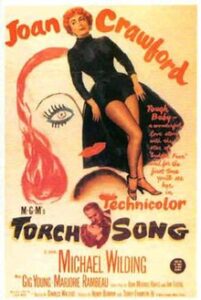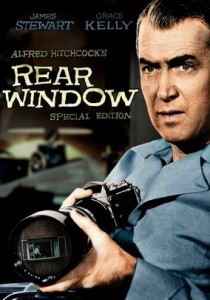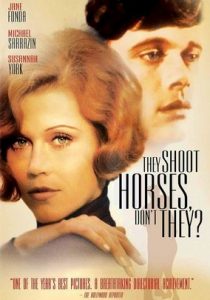Torch Song-1953
Director Charles Walters
Starring Joan Crawford, Michael Wilding, Gig Young
Scott’s Review #1,402

Reviewed September 25, 2023
Grade: B
Since I’m a huge fan of legendary Hollywood Actress Joan Crawford, I’ll willingly watch any of her films, both quality and mediocre.
Her style, confidence, clothes, makeup, and, yes, those eyebrows capture me every time I see her. She’s also a damned good actor.
Torch Song (1953) is a film made when her career was waning despite just scoring an Oscar nomination the year before for Sudden Fear (1952).
She would find success in the 1960s with Whatever Happened to Baby Jane? (1963).
The film is fun to watch because it reportedly best captures her true personality in a role that is realistic to who she was. Faye Dunaway even studied the role closely before she portrayed the star in 1981’s cult classic Mommie Dearest.
The story is about a talented and demanding Broadway star named Jenny Stewart, played by Crawford. She is used to snapping her fingers and having her every whim catered to without question. She rewrites scenes and fires talent for shows she stars in if she deems them beneath her.
One day, she meets her blind rehearsal pianist, Tye Graham (Michael Wilding), and finds herself attracted to him. At first, clashing over his refusal to put up with her bullshit, she comes to realize she admires him.
The feeling is mutual,l and the lovebirds tenderly nurture their budding relationship.
I’m unsure if non-Crawford fans would appreciate or enjoy Torch Song as much as we die-hards would. The story is essential, with few twists and turns, and it’s not hard to imagine that Jenny and Tye will wind up together.
Torch Song was famously spoofed by comedienne Carol Burnett in the 1970s on her television show when she replicates a dress rehearsal scene from the film in a hilarious fashion.
But Crawford is devilish and fierce in the film. She prances confidently in each scene wearing getups as outlandish as a haughty yellow nightgown with high-heeled slippers and a garish scene from the production wearing ‘black face’!
When she yanks off her wig, revealing her messy red hair, black face, and wide, emotion-infused eyes as she desperately watches Tye exit the auditorium, the scene rivals any scary scene from a horror film.
Jenny is the star as much as Crawford is, and one wonders if she had the same ferocious clout as the fictitious character. We’ll have to ask the cast if any are still alive.
India Adams dubbed Crawford’s singing voice. She lip-syncs to the recording Adams originally made for Cyd Charisse in a number discarded from the 1953 film The Band Wagon.
When she belts emotional numbers like ‘Two-Faced Woman, the comic relief is unintentional. Adams sounds nothing like Crawford, which makes the dubbing glaring and nearly pitiful. Crawford had a decent voice and sang songs that were only available on the home video release.
Oddly, actress Marjorie Rambeau, who played Crawford’s mother, received an Oscar nomination for the role. Her performance is adequate but not Academy Award-worthy.
This must have irritated Ms. Crawford, who wasn’t known for being a gracious co-star. She must have felt usurped.
Crawford seamlessly carries the film from beginning to end credits like the seasoned professional she always was. She pokes her co-stars and chews up the scenery like nobody’s business.
Deserving of mention is actor Michael Wilding since he is equal to Crawford in performance. He never appears outshined or swallowed whole during a scene; instead, he relays good chemistry with her.
A mediocre Torch Song (1953) is made better by the mix of the competitive Broadway lifestyle and the star playing a ferocious and seasoned veteran.
Oscar Nominations: Best Supporting Actress-Marjorie Rambeau


